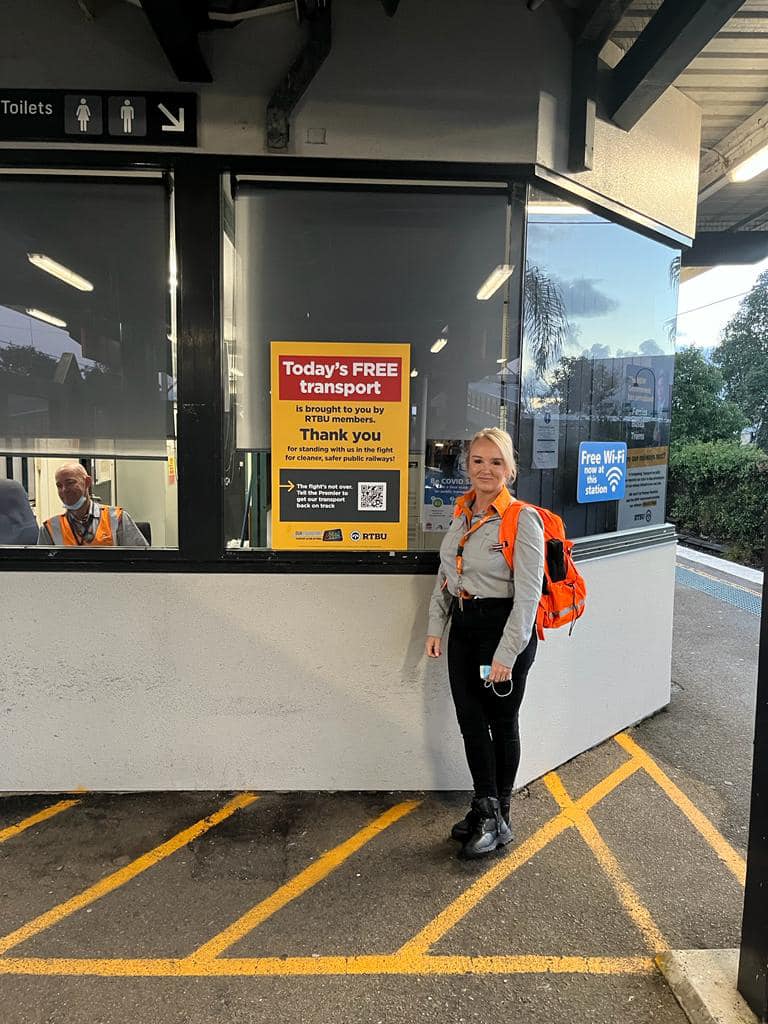
Daily news…The swift actions of an intercity train guard have shown why the Rail Tram and Bus Union needs to continue to pressure the NSW Perrottet Government to fix safety issues with its imported New Intercity Trains (NITs).
Intercity commuters have a lot to put up with – some travel from Newcastle, the Blue Mountains or Illawarra (over two hours one-way) to work in Sydney and the least they can expect is safe transport to get to work and home again. That has been the basis for the Rail Tram and Bus Union’s (RTBU’s) ongoing industrial battle with the Perrottet Government to sustain the current safety role of train guards and fix some glaring safety problems with the NITs.
State Member for Gosford, Liesl Tesch, joined the local community in thanking a Transport NSW train guard who bravely protected someone in distress at Tascott Station.
The guard, who wishes to remain anonymous, recounted the events that unfolded, and the actions he took to ensure that a person’s life was saved and coordinating broader emergency responses.
“I was surprisingly calm. I had a job to do,” the guard said. “As we were pulling out of Tascott station, I heard ballast movements – and I have been around long enough to know that these rocks do not move unless somebody moves it. So, I look down and see movement in the gap between the platform and the train.
“I immediately hit the emergency brake, informed the driver, and hopped off the train to investigate. Once I realised what had happened, it was really reflex at that point. I got on the radio, contacted operations so that other trains would not come, and had Triple 000 on the other line.
“It was a lot – I needed to watch out for trains coming, trying to give the injured person medical attention, relaying information to the ambulance as well as operations. Once police arrived, I was advising emergency responders how to access the rail corridor safely and ensure that we could get the person out and off to safety.”
Ms Tesch said the incident highlighted the vital role train guards have across the transport network.
“What the public sees train guards do and what their whole job is are very different. We see them make announcements, blow whistles and wave flags. They also are vital in delivering a safe and efficient public transport system by undergoing safety inspections, doing minor maintenance jobs, and communicate on the behalf of train drivers so that they can fully focus on driving trains,” Ms Tesch said.
“Without train guards, our public transport system is less safe and less efficient, and the incident that occurred at Tascott could have been a lot worse if not for the presence of this guard who had a clear job to do and was trained to deal with these situations.”
The train guard wanted to share his story to express the importance of the train guards in ensuring the safety of the public.
“If I was not there no one would have seen the person in time. If there was no train guard and it was up to the driver alone to monitor this, we would not have seen them. I want to make sure that we are there, always,” the train guard said. “Sure, there are CCTV cameras for safety, though that alone would not have helped – you would have high-definition footage of a tragedy with no one there to stop it.”
Ms Tesch said she hoped the incident would be a lesson for the NSW Government to listen to the concerns raised by the RTBU.
“Unfortunately, the NSW Government have decided to replace train guards with CCTV. Clearly this incident shows that without train guards passengers are not as safe,” she said.
“This story truly brings to light a broader point. Train guards are just as important as the driver, and to replace them or automate their roles is a failure to appreciate their significant role.”
The RTBU has been sustaining a campaign to have the safety issues with the NIT fixed for almost two years.
The Perrottet Government has now taken the union to court over its plans to turn off opal machines at train stations, which would allow the public to travel for free.
The union’s main concern about the NIT relates exactly to the situation at Tascott. Passengers could be at risk from surveillance blind spots which means accidents, such as falling into the gap between the platform and the train might go undetected.
The RTBU has been fighting the NSW Government’s plan to downgrade the role of train guards to that of a “customer service guard” located in a crew compartment to monitor the train’s CCTV instead of the guard’s current role of physically checking passengers as they board and disembark from trains.
The Tascott incident demonstrates the risks of drivers and guards relying solely on CCTV’s mounted on the sides of trains to monitor passenger safety.
The RTBU’s National Secretary Mark Diamond, has had the following to say about the Perrottet Government’s decision to challenge the union’s opal card switch off.
“When the Rail, Tram and Bus Union filed an application for protected industrial action to turn off opal readers at train stations, the NSW State Government seemingly waved it through without protest.
“All they really asked for was that the union give them more notice before taking the action.
“But then, just as the union was about turn off the opal readers, NSW Premier Dominic Perrottet suddenly sprang out of the bushes screaming that the action was ‘illegal’ and threatening to sue workers for lost revenue.
“The Premier obviously thought he was laying a clever and carefully disguised bear trap – hoping rail workers would walk into straight into it so that he could bankrupt their union and break their spirit.
“But Dominic Perrottet isn’t poking a single bear. He is poking a hornet’s nest.
“And if he continues playing this immature but high-stakes game with the livelihoods of public sector workers – whether it be on the railways, in our schools or in our hospitals – he should be prepared for the repercussions.
“Where Gladys Berejiklian so easily succeeded in negotiating new enterprise agreements for NSW railway workers during her years in office, Perrottet has failed. To save face, he now intends to sue the Rail Tram and Bus Union (RTBU) out of existence.
“In the NSW Government’s application to the Federal Court it also alleges that when railway workers left gates at stations open, that this was not a form of ‘industrial action’ under the Fair Work Act 2009 and therefore not protected and permissible behaviour.
“Due to an anomaly in the Fair Work Act that the previous Federal Government failed to fix, Perrottet is now salivating at the possibility that leaving gates open was actually not ‘industrial action’ which, if correct, could only be fully appreciated after the fact. If correct, it may even allow him to bankrupt the RTBU.
“When NSW rail workers opened gates as part of their efforts to pressure the NSW Government for a fair and reasonable pay rise, they thought they were acting within the confines of the law, and in a manner that would cause no inconvenience to the travelling public.
“Railway workers followed all processes required under the legislation. They applied for a Protected Action Ballot Order which included the action, the order was granted by the Fair Work Commission, they voted on whether they wanted to take the action, they notified their employer of their intention to take the action, and then finally, they took the action. All of this was done in good faith in the belief that what they were doing was legally permissible.
“Despite following every legal step, the NSW Government is now alleging that their behaviour was not lawful. The basis of their claim is that opening gates or leaving them open does not fall within the technical legal definition of ‘industrial action’. The term, as defined in the legislation, includes work being performed in a manner different from that in which it is customarily performed, a ban or limitation on the performance of work, or a refusal to work.
“It seems the NSW Government is going to dance with semantics and say that opening gates or leaving gates open does not fall within the technical legal definition.
“Although accounts vary, some government officials have said that the overall revenue in a day collected by Sydney Trains and NSW Trains is about $30M. Media reports have indicated that the lost revenue from the gates being open may be about 10% of a day’s takings.
“At $300,000 per day, the RTBU would be faced with a crippling bill.
“Perrottet’s act is the most aggressive attack currently available to him. It is a throwback to the industrial disputes on the wharves in the late 90s. The fact that Perrottet sat down with key players from those days recently suggests that he is just warming up rather than leaving such malevolence to the dust bins of history.
“Railway workers, like all Australians have had enough of unnecessary conflict and just want to live a dignified life with a fair days pay for a fair days work.
“Across Australia, well over 90 percent of workers in passenger rail are unionised and our members right across the country are outraged over Perrottet’s attempt to bankrupt their representative organisation.
“Most railway employees have worked and played together for years. We are, in short, a family. And like any family, you may take our home but we will always band together in the face of adversity.”
NSW Minister for Transport, David Elliot has been asked for comment and The Point will update this article with his response when it is received.


